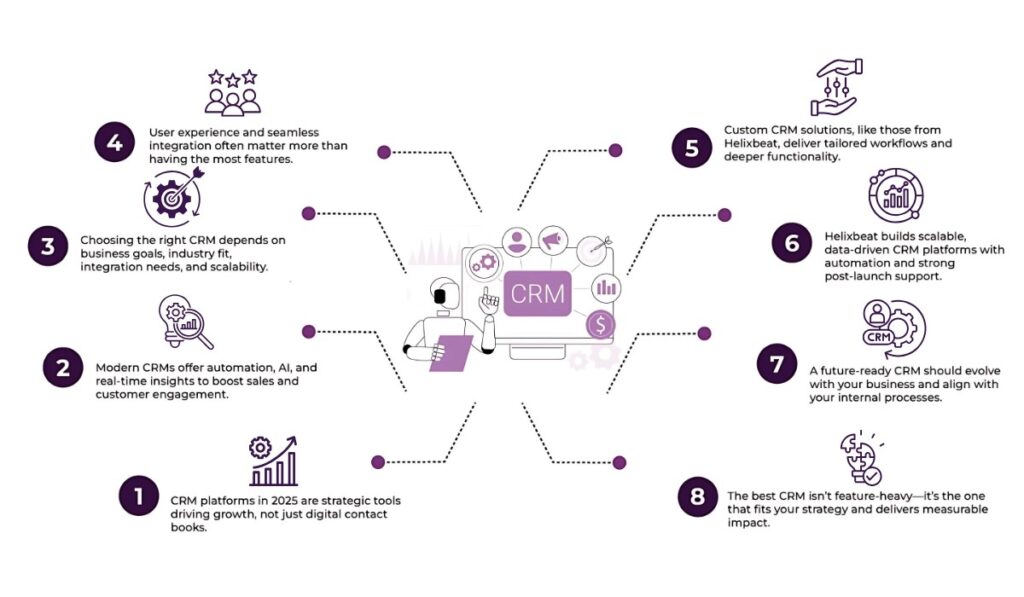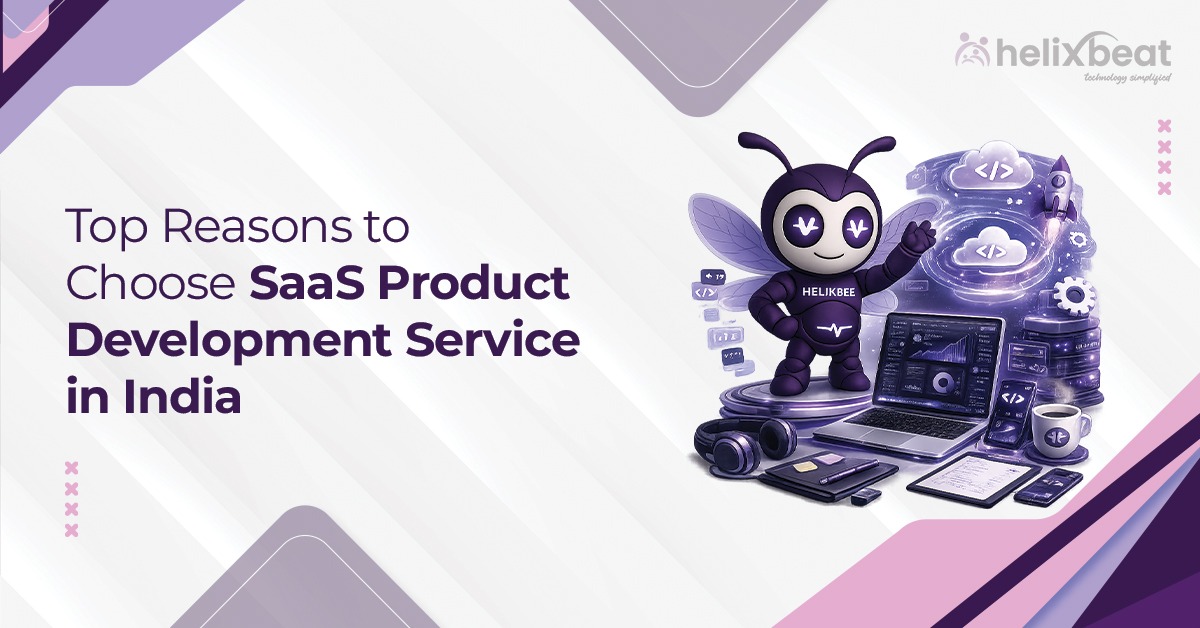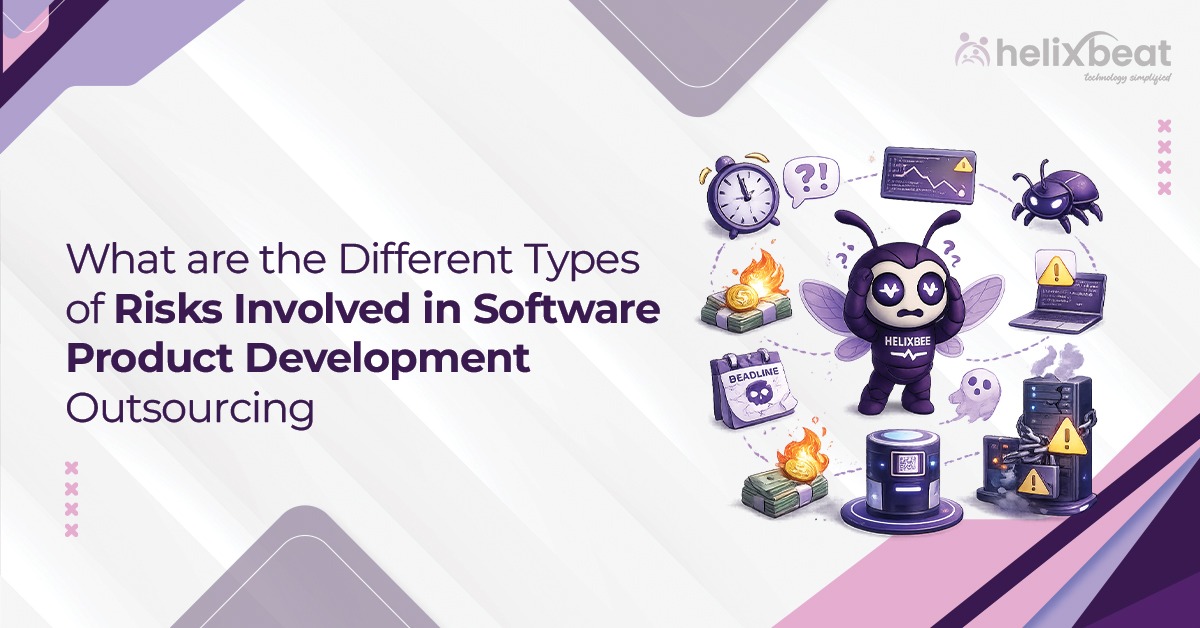What if the secret to scaling your business in 2025 isn’t a new product, but the way you manage relationships?
Entrepreneurs and IT decision-makers are no longer just choosing CRM platforms—they’re investing in systems that become the backbone of their growth strategy. CRM software has evolved far beyond contact management. It now drives sales, automates communication, and provides real-time insights that steer business decisions. With multiple options in the market and rising customer expectations, selecting the best CRM platform is no longer just a technical decision—it’s a strategic one.
That’s where companies like Helixbeat come in. With their tailored CRM development services, they’re helping businesses redefine how customer engagement works—from startups to enterprises.
Let’s dive into what really matters when choosing the right CRM platform in 2025 and how you can find a solution that fits your business like a glove.

Table of Contents
How Has CRM Evolved, and Why Should You Care?
CRM isn’t what it used to be—it’s smarter, faster, and deeply integrated into core business operations.
Back in the day, CRM platforms were little more than digital Rolodexes. Now, they integrate with your email, website, analytics tools, and even your WhatsApp chats. A sales rep no longer has to manually log each lead. With automation and AI, the best CRM platforms can predict behavior, trigger timely follow-ups, and even score leads based on their likelihood to convert.
Example: Think of an e-commerce brand tracking repeat buyers. A smart CRM platform can alert the marketing team when a customer hasn’t made a purchase in a while and automatically send a re-engagement offer.
In 2025, CRM is no longer optional—it’s central to how you understand your audience, serve your clients, and scale your operations. Whether you’re doing a CRM software comparison or choosing the best CRM platform for your business, the right system can help you stay ahead.
What Makes a CRM Platform “The Right One” in 2025?
Not every CRM is built equally, and more importantly—not every CRM is built for you.
Some are great for enterprise workflows; others are designed for lean startup teams. Some shine in customer service; others are built for sales automation.
When doing a CRM software comparison, here’s what you should look for:
Industry Fit
A CRM that works for a SaaS company might not suit a manufacturing firm. Look for CRM platforms that cater to your industry or platforms that allow for customization to meet specific needs.
Customization Capabilities
You don’t want a one-size-fits-all solution. You want your CRM software to adapt to how your team works—not the other way around. This ensures that the system feels like a seamless extension of your operations.
Integration Support
The best CRM platforms integrate smoothly with the tools your team already uses—think Gmail, Slack, accounting software, or customer support platforms. This minimizes disruptions and maximizes productivity.
Real-Time Data Access
Decisions are only as good as the data behind them. CRMs like the ones developed by Helixbeat offer real-time dashboards and analytics, giving you insights when you need them most, driving better decisions.
Scalability
What works for 50 customers might not work for 5,000. Your CRM should grow with you, offering the flexibility and scalability needed to adapt to business growth.
Choosing the right CRM isn’t just about the features—it’s about finding the system that fits your needs, whether you’re a startup or an established enterprise.
5 Tips to Choose the Right CRM Platform in 2025
Choosing from hundreds of CRM platforms can feel overwhelming. These five tips will simplify your decision:
1. Start With Your Business Goals
Are you looking to improve lead conversion? Reduce churn? Or get better forecasting? Clarifying your goals helps narrow down your options. Whether you need a CRM software for better customer retention or more accurate sales forecasting, defining what you need first makes it easier to evaluate the right CRM platforms.
2. List Down Must-Have Features
Make a list of non-negotiables—like email marketing, mobile access, or multi-language support. Then match those to CRM platforms that deliver. Look for solutions that specifically meet your requirements and avoid getting distracted by excessive features you won’t use. A CRM software comparison can help identify which platforms align best with your priorities.
3. Don’t Ignore User Experience
A powerful CRM is useless if your team hates using it. Always test for ease of use and dashboard simplicity. The best CRM platforms prioritize user experience, ensuring that your team can adapt quickly without frustration. A user-friendly interface will ensure adoption across your organization.
4. Prioritize Integration Over Features
Instead of chasing feature-rich CRMs, look for ones that plug into your existing ecosystem. That way, your data flows seamlessly across systems. Whether it’s connecting with your email platform, payment system, or customer support software, seamless integration is key to maximizing CRM performance. Remember, integration is often more valuable than individual features.
5. Opt for Future-Ready, Scalable Solutions
Choose CRM platforms that offer room for growth. If you plan to double your sales team next year, your CRM should support that expansion without extra costs or complexity. Ensure the system is flexible enough to evolve as your business grows. The best CRM for small business solutions offer scalability, so you won’t need to switch platforms as your business expands.
Why Custom CRM Platforms Are the Right Choice?
Sometimes, off-the-shelf just doesn’t cut it—especially when you have unique workflows or compliance needs.
That’s where custom CRM development becomes a game-changer. Take Helixbeat, for example. They analyze your business requirements and build CRM platforms that:
- Centralize customer data across departments
- Automate follow-ups, reminders, and report generation
- Offer smart dashboards tailored to KPIs that matter to you
- Integrate seamlessly with marketing, sales, and service tools
- Scale as your business grows without the need for major upgrades
Example: A real estate firm might need a CRM that sends reminders to clients about property viewings and automatically generates agreements post-meeting. A custom-built CRM platform by Helixbeat would create that flow in days—not months.
When comparing CRM software, a CRM software comparison will often show that custom-built solutions like those from Helixbeat offer flexibility and tailored fit that off-the-shelf options simply cannot provide. Choose a custom CRM that grows with your business and adapts to your needs.
How Helixbeat Helps You Build the Best CRM Platform?
At Helixbeat, we’re not just another software company—we’re CRM builders who treat your business like a blueprint.
Here’s what we bring to the table:
Requirement Analysis
We start by understanding your business goals, customer journey, and operational bottlenecks. Our aim is to build CRM platforms that truly fit your unique needs.
Custom CRM Development
Whether from scratch or enhancing an existing system, we focus on building a CRM platform that’s user-friendly, optimizes workflows, and centralizes data. This ensures you get the best CRM platforms tailored to your team’s processes.
Seamless Integration
We ensure your CRM integrates smoothly with your sales tools, marketing platforms, and support systems, so everything works together seamlessly, making your operations run like clockwork.
Real-Time Analytics
With instant access to dashboards, behavior trends, and predictive metrics, we help you make informed decisions without delay. Our CRM platforms provide powerful analytics that keep you ahead of the curve.
Automation Features
From scheduling follow-ups to triggering notifications for deal closures—automation frees up your team’s time, helping you focus on what really matters. With our CRM software, you can automate repetitive tasks and increase efficiency.
Post-Deployment Support
Our work doesn’t end at launch. We offer 24/7 support, continuous training, updates, and future enhancements to make sure your CRM evolves with your business.
Whether you’re a startup building your first CRM or an enterprise switching from legacy systems, we create CRM platforms that are ready for the future.
Final Words
Choosing the right CRM platform in 2025 isn’t just about ticking checkboxes. It’s about aligning technology with your business strategy.
When CRM platforms are thoughtfully selected and well-integrated, they become more than just software—they become a core part of your growth engine.
You want a system that understands your customers, improves internal communication, tracks KPIs, and, ultimately, drives revenue. Whether you go for a generic platform or opt for a custom-built CRM by Helixbeat, make your choice based on clarity, not trends.
Because in the end, it’s not about having the most features. It’s about having the right ones—for your business.
FAQs
1. Are custom CRM platforms better than off-the-shelf ones?
Yes, especially if your business has unique workflows. Custom CRMs (like those by Helixbeat) offer flexibility, scalability, and deeper integration.
2. How much does it cost to build a custom CRM?
Costs vary depending on complexity, features, and integrations. Helixbeat offers flexible engagement models for startups and enterprises alike.
3. Can CRM platforms integrate with tools I already use?
Yes. Most modern CRM platforms, especially custom-built ones, integrate with popular tools like Gmail, Slack, and payment gateways.
4. What are some signs that I need a new CRM?
If your team struggles with manual tasks, data silos, or lack of visibility into customer interactions, it’s time to upgrade.
5. How does automation in CRM help my business?
Automation saves time, reduces human errors, and improves lead nurturing and follow-ups, ultimately leading to more conversions.














